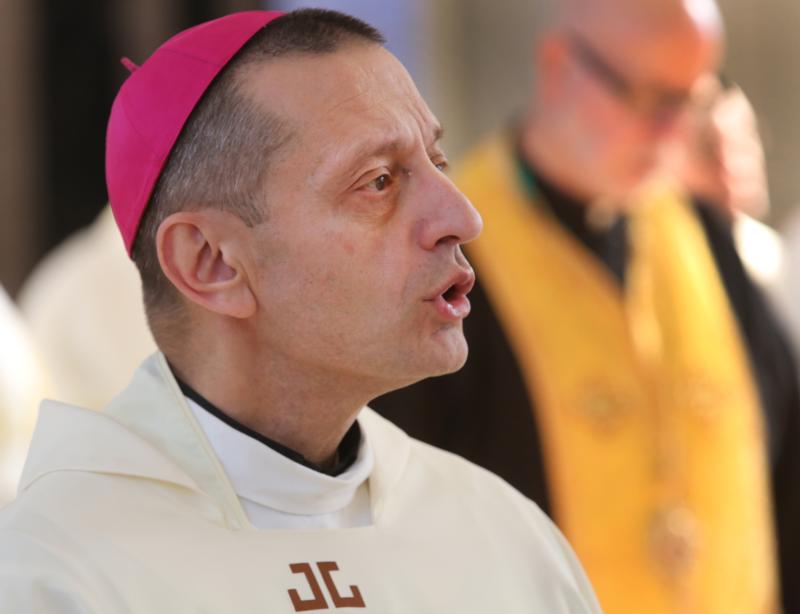By Christopher White, The Tablet’s National Correspondent

PANAMA CITY, Panama – At last fall’s Vatican summit on young people, Bishop Frank Caggiano was the first participant to raise the issue of clerical sex abuse. On Wednesday, when he addresses English language pilgrims gathered in Panama for this week’s World Youth Day, he’ll once more weigh in on that same topic.
“I will not dwell on it for long,” he told The Tablet in an interview on Tuesday, “but I’ll begin by giving young people a choice.”
Bishop Caggiano, who leads the diocese of Bridgeport and who is widely considered as a rising star among the U.S. hierarchy, says he’ll return to an image he’s used on several occasions, that of twilight.
“It happens twice everyday: dawn and dusk,” he said. “And I’m going to ask young people: where do you want to stand?”
“I’m going to invite them to stand in the dawn, which is a personal commitment to holiness, where it doesn’t depend on what others around you are doing,” he continued.
The 59-year old Brooklyn native, who doesn’t mince words, isn’t naïve, adding that he recognizes the difficulty of such a commitment at a time when “leaders and those you depend on do not walk the road of holiness.”
“That’s something they’ll have to answer for before God,” he said. Even so, whether to commit to holiness is “an inescapable choice for every believer.”
At World Youth Day – where over 12,000 pilgrims from the U.S. will be on hand, as well as another 140,000 participants – Bishop Caggiano says he hopes that when young people see that there are thousands of other young people asking the same questions and sharing in the same commitments, they’ll leave vowing “to allow the light to grow in us … and scatter the darkness.”
As one of the U.S. bishops selected to participate in last October’s Synod on Young People, Faith, and Vocational Discernment, the theme of young adults in the Church has consumed much of Bishop Caggiano’s life in recent months.
In the three months since he’s been home from the synod, he says that the idea that’s gained the most traction from the synod’s concluding document is the idea of mentoring (or “accompaniment,” as Pope Francis often terms it).
“I think it is being received mostly as ‘who are the faithful witnesses that can both guide us and who we can look up to as role models,’ which I find very inspiring,” he said.
“From the earliest times, the Lord sent them out two by two for a reason. Not just simply for mutual support – like the road to Emmaus – somehow you co-form each other,” he told The Tablet.
Beginning next month, he’s gathering young leadership within his diocese to begin formulating a plan to actually tease out what this process of mentorship will look like.
Given the current crisis of leadership within the Church, Bishop Caggiano said that “leadership is most effective when it’s most local.”
In the coming days in Panama, he believes participants will hear Pope Francis expand on the idea of vocation, drawing from the Synod’s reflections.
Noting that traditionally the Church has spoken about vocations on three levels – the universal call to holiness that all people share in, and then the permanent states of married life or consecrated life – he said that “We’ve always been uncertain about how to speak of the states of life that are not permanent but are meaningful to holiness.”
“The synod gave language to that,” he continued, adding that for young people, the single life is at the heart of many struggles and that it’s the Church’s duty to evidence that “it’s meaningful and has tremendous value that you must live day by day.”
At this point, Bishop Caggiano is a World Youth Day veteran. Panama is his fifth, going back to Sydney in 2008, and on the last two he served as the event’s liaison among the U.S. bishops.
Even though he usually comes back jetlagged (Panama will be the happy exception, given that it’s the same time zone as the East Coast), he’s a strong believer in the event because he returns encouraged by the enthusiasm and faith of young people in the Church.
“It forces me to go back to the basics and what’s really essential,” said Bishop Caggiano. “Being a bishop in the contemporary Church, you’re wrapped up in a lot of important work that is not, on the surface, kerygmatic.”
“Administration is needed,” he said, “but it’s like my dad fixing the roof of the house. It’s an act of love, but it’s kind of a few steps removed from saying, ‘I love you.’”
While some have questioned the need for such a large-scale event that takes years of planning and is often a huge financial burden on the host country – especially at a time when Pope Francis has called for ‘a poor Church for the poor” – Bishop Caggiano insists that “false choices put us in a debilitated place.”
“The genius of Catholicism is that it’s never either/or, it’s always both/and,” he said.
For Caggiano, World Youth Days are an investment in the future leaders of a diocese.
“I see this place as the seedbed of leadership,” he said, adding that the real question for dioceses is how and what they will do after the event is over with and pilgrims return home in order to get a proper return on their investments.
“There is no community that can prosper without investing in its people,” he said.
